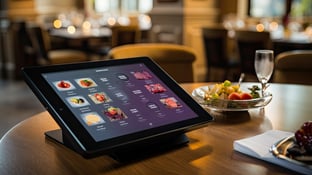Choosing the right restaurant POS can depend on the nature of your operation. We’ve written in the past about industry-leading POS providers like Toast and Square as well as more specialized POS options for operations such as food trucks. The right POS for your restaurant will depend on a number of factors including your budget, the size of your operation, and the compatibility of the systems you already have in place.
However, regardless of the POS you choose, a growing number of restaurants are opting for cloud-based POS systems over traditional on-premises POS systems. So what exactly is the difference between cloud POS and traditional POS systems? And which type of POS solution is right for your restaurant?
Let's explore some of the features between cloud based POS vs traditional POS systems, and perhaps we'll discover the reasons why so many restaurant operators are moving their systems to the cloud.
What’s the Difference Between Cloud POS and Traditional POS Systems?
First thing's first: let’s start by defining “the cloud.” The cloud is a global network of computer servers that store data, run applications, and deliver services across the internet. When your business uses cloud-based solutions, your data and applications also “live on the internet."
Therefore, when your restaurant uses a cloud-based POS, your access to your data and point-of-sale applications is supported by a remotely-located third-party provider.
In contrast, an on-premises POS system operates as a sort of closed circuit within the confines of your restaurant. Sometimes also referred to as traditional or legacy systems, on-premises POS solutions use onsite servers to store data and power sales applications.
So in short, the primary difference between cloud POS and traditional POS systems is that the cloud-based systems rely on remote servers while traditional POS systems rely on a single server located within your restaurant.
What Are The Advantages of a Cloud-Based Restaurant POS?
To gain a deeper understanding of cloud based POS vs traditional POS systems, we spoke with Luisa Castellanos from restaurant tech support group, Science on Call. Luisa explained that the primary competitive advantage of a cloud-based POS system is that restaurant operators can access it from anywhere via the internet.
"About 10 years ago, there was a noticeable shift in the number of restaurants utilizing cloud systems," said Castellanos. "Operators started seeing each other’s success with cloud-based POS systems, and realizing that, with the cloud, no longer would they have to be at their shop to make changes to the menu or push updates and promo codes — they could essentially run their businesses remotely.”
This represented a major leap forward in data access, productivity, and collaboration, especially for operators with restaurants in multiple locations. Moreover, as the use of online ordering and takeout/delivery apps has grown, cloud-based POS systems have helped to integrate incoming transactions and sales data from a variety of channels and coordinate this information with real-time inventory tracking.
Cloud-based POS systems also help to enable mobile and table-side transactions. Indeed, companies like Square and Toast run their software on lightweight mobile and handheld devices, which means your front-of-house team can take orders, process payments, and turn over tables with greater speed as well as a dramatically reduced risk of error.
Are Traditional POS Systems More Reliable Than Cloud-Based POS Systems?
One concern restaurant operators may have with cloud based POS vs traditional POS systems is reliability. For restaurants that have historically relied upon onsite servers, there may be a perception that online systems are more vulnerable to security breaches or disruption.
In fact, said Castellanos, the opposite is true. Relying on a single, on-premises server is far riskier.
“If that server goes down, everything goes down,” Castellanos said. “You typically have to call the support number associated with the vendor to have them send a technician out. You’re out of service for the day, because you’re waiting for someone to physically come and repair your equipment, and you can’t process credit cards until they do.”
This differs from cloud-based POS systems, which can actually continue to perform their most critical functions even when your internet connection is disrupted.
“With a cloud-based POS system, you can typically take credit card payments even when you’re off-line,” said Castellanos. “The system collects the data, stores it, and processes the transactions as soon as the internet comes back up.”
Another key difference between cloud POS and traditional POS systems is the heightened security you get with remote storage.
“The cloud is safe,” said Castellanos. “The credit card information collected is all encrypted. All of the major cloud-based POS systems are PCI compliant. They have to be — they have so many customers that they have to make sure the data is protected.”
In other words, when you opt for a cloud-based POS, you gain the safety and redundancy of a massive multi-server network. If something goes wrong, your data is backed up on the cloud. This is not the case with a legacy POS.
“If you have an on-premises POS, and your equipment gets destroyed in a fire or a flood, you lose everything; there is no backup out there,” Castellanos said. “Or if somebody comes in and steals your terminal, they might not be able to get at your data, if it’s password-protected — but you can’t get to it, either.”
Which System is More Affordable?
The answer to this question is a bit of a mixed bag. Cloud-based POS systems require a smaller up-front investment than do on-premises setups.
“With the traditional brands, a single terminal is going to run you at least a thousand bucks,” Castellanos said.
So in the short run, you will spend less to set up your cloud system. However, over the long-term, your cloud POS provider will charge you for software updates, ongoing licensing fees, and perhaps options like loyalty programs and gift cards.
“Over time,” said Castellanos, “the cloud option is actually almost always more expensive.”
That doesn’t mean implementation of a cloud-based POS isn’t worth the money. The benefits outlined above make it a valuable investment, one that can ultimately improve your productivity and profitability in the long run.
“Don’t blindly trust what these companies tell you on their websites. You really have to do a lot of your own research in this process," Castellanos advised. "Talk to the sales representatives, request demos, ask questions, see if you can get a better deal on the rates listed — even the cloud-based companies can be flexible. And definitely talk to other restaurant owners you know. See what they’re using and get their reviews.”
What Does the Future Hold for Restaurant POS Systems?
Despite the costs and risks outlined above, Castellanos suggests that cloud-based POS systems are the future of restaurant tech.
“If you’re starting from scratch, any POS you pick is going to be expensive,” she said. “But cloud-based systems are more scalable, and those are the companies that are constantly coming up with new ways for users to generate data insights.”
Is it time that your restaurant invested in a new POS system? Begin your research process by learning more about the top POS vendors in the industry today.
Additional reporting by Lexie Kelly Wainwright
[Photo by Clay Banks on Unsplash]





